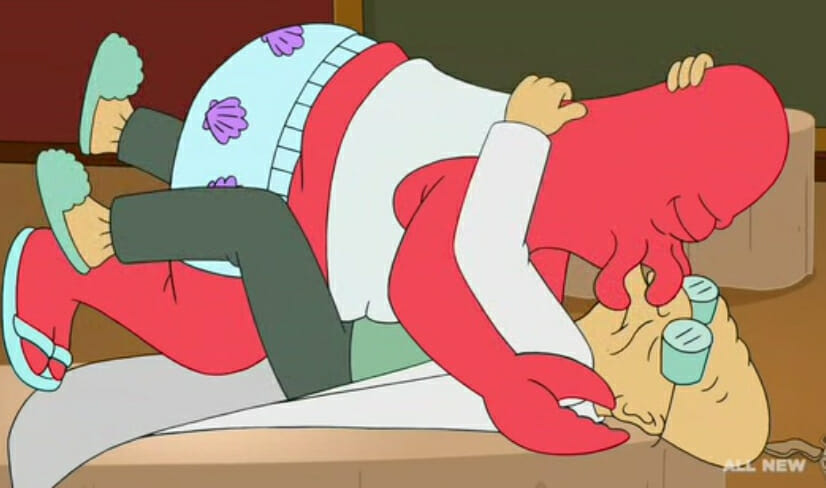Futurama: “The Prisoner of Benda” (6.10)

Many of Futurama’s best episodes are a result of good old fashioned science-fiction thinking, plus a slight satirical twist. Switching minds isn’t really a tough concept to grasp, nor was the time travel from a few episodes back. It just so happens that, for whatever reason, the Professor’s inventions seem to only work in one direction these days. So while before we could only move forward in time, in “The Prisoner of Benda” what we have is mind-swapping that can only happen in one direction. Simple enough, eh? It’s a credit to the show that this isn’t at all the case.
Single-directional body swapping means that two other parties must be involved for things to return to how they were—the switchers don’t immediately realize it, and more and more parties are gradually required for us to end up back where we started. So the entire Planet Express Crew, (err… the whole crew minus Scruffy) gets switched at least once, including several outside parties get introduced. Not only do we see how everyone reacts to using one or more foreign bodies throughout the episode, minds are also swapped with a Hungarian monarch and a wash bucket (and momentarily with those mathematical Globetrotters). There’s also a series of other new characters we’re introduced to from both a travelling circus and the monarch’s treacherous entourage.
Bringing in these new characters is a good thing, not just because it took this particular episode in some fun directions (with particular points going to the wash bucket’s unrequited love for Scruffy), but also because it’s a twist on one of animated television’s perennial scourges: character reuse. That might not sound so bad, but hear me out: The Simpsons, Family Guy, South Park, Venture Brothers, etc. etc. etc. are all at their best when characters are only brought out when they’re actually necessitated by the plot. Unfortunately, despite the theoretically limitless nature of animation, real-life production budgets require characters to turn up again, which gives us the same jokes as before, or forces plots to go in dumb new directions. Krusty the Klown is an interesting character so long as he’s being a clown on TV—when he’s showing up for no real reason in, say, a driver’s education course for one weak gag, then you have a problem.
-

-

-

-

-

-

-

-

-

-

-

-

-

-

-

-

-

-

-

-

-

-

-

-

-

-

-

-

-

-

-

-

-

-

-

-

-

-

-

-








































